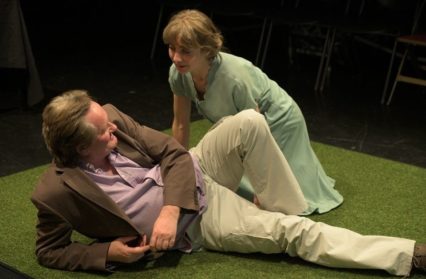Emily Garside reviews the latest production from Company of Sirens, Twelve Cabins Twelve Vacancies, a slow-burning homage to childhood and Hitchcock.

In life, we are used to the intersection of personal and public events. But there’s an interesting kind of personal/public dynamic with the cultural events that come to mean something beyond themselves, because of the moment we encountered them. Nobody would look at Psycho for a tender exploration of love and loss, but for Chris Durnall the intersection of seeing this movie on TV as a youngster and his father’s death have made it exactly that.
In a piece that feels half-diary entry half-film analysis class, performer and collaborator Angharad Matthews occupies a re-enactment of Marion Crane’s lines in the film, as well as playing Durnall’s mother, while he narrates the experience and the film. Staged on a strip of fake grass, with a table and some period props to bring to life aspects of the story, the piece is accompanied by a haunting live score by Rhys Anderson. Looking up at a white screen, sometimes populated by old black and white photographs of Durnall’s parents and his family, Durnall and Matthews explore seemingly disconnected scenes, moments from life and film, invoking the ghosts of both film past and personal past.
It’s a discordant experience talking about the film without the film. It raises an interesting question for those with no conceptual knowledge of Psycho at all: how does this piece read differently? Those who know the film well will presumably ‘see’ the film as the actors describe it, visualising and understanding the references to the story. Those with a vague knowledge – perhaps having seen it once, a long time ago – will be able to visualise the actors perhaps, the general setting but nothing more. And what of those who haven’t seen it and have no real concept of the piece? Are they creating their own conceptual cultural moment in their heads based on piecemeal pop culture references?
Another slightly discordant element of the piece is that while one element – the staging and commentary on the film – is theatrical, and theatrically experimental – much of the writing does not feel like it is designed for theatre. In particular, Durnall’s speeches feel prose-like, but they don’t really feel or sound like they are written for the stage. Perhaps again this is a deliberate element, in keeping with the discordant, unresolved and piecemeal element of memories, but there is something that doesn’t quite fall into place with the flow of the piece. Stronger is the writing and speech of Angharad Matthews’ character. Her surreal, ghost-like appearance mixes dialogue from the film and an almost dream-like encounter with Durnall.
The staging of the piece offers an intimate experience, with the audience positioned close to the actors. It’s quietly presented, quietly spoken. Again there’s a discordant element between Durnall’s and Matthew’s performance. Durnall is clearly delivering anecdotal, personal stories, without real elements of performance, while Matthews’ is a truly theatrical and thoroughly engaging performance. As with the film narration, it’s an interesting experiment, but one that perhaps doesn’t quite reach its potential.
Twelve Cabins Twelve Vacancies by Company of Sirens ultimately offers a sincere and endearing exploration of grief and how it affects and resonates across life. And some of the writing on grief is beautifully expressed. In his programme notes Durnall calls it ‘the poetry of the ordinary’ and this encapsulates and expresses it perfectly – the pain of grief in the everyday.
Theatrically and narratively not everything in Company of Sirens’ Twelve Cabins Twelve Vacancies lands. It relies too heavily on narration and at times knowledge of both the film Psycho and a kind of strange film theory lesson. The writing also doesn’t fully explore the big themes it sets up. As frustrating as these elements are, however, there’s no denying the sincerity of both the theatrical exploration and the motivation and emotion behind the piece. It does in fact almost feel like a work in progress – one that with further development and exploration could really open up a theatrical and personal exploration on grief and how we carry it.
The website for the Company of Sirens will provide updates for all future production.
Emily Garside contributes often to Wales Arts Review.











